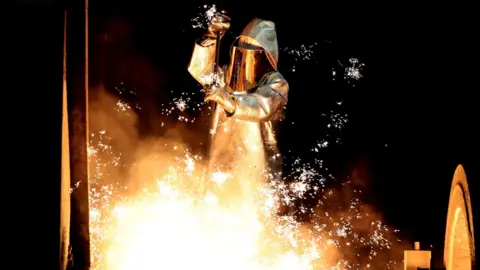Tata and ThyssenKrupp steel merger faces EU probe
 EPA
EPABrussels will open an in-depth investigation into the planned merger of Tata Steel and ThyssenKrupp, saying it could cut competition.
The European Commission said it was concerned that customers would face higher prices and fewer suppliers if the merger was allowed to go ahead.
The deal includes the UK's biggest steelworks, at Port Talbot in Wales, and has been welcomed by unions.
It would create Europe's second-biggest steelmaker after ArcelorMittal.
The Commission said it was concerned that combining Tata and ThyssenKrupp's European carbon steel and electrical steel businesses could result in market dominance.
"Steel is a crucial input for many of the goods we use in our everyday life, and competitive steel prices are vital for the European economy," said Competition Commissioner Margrethe Vestager.
A Thyssenkrupp spokesperson said an in-depth probe was to be expected given the size of the deal and that it would continue to work closely with the Commission.
 Getty Images
Getty ImagesSome asset sales may be needed to win approval for the merger.
Although Moody's said the combined venture would account for just 14% of European crude steel production, far behind ArcelorMittal's 29%, another industry expert said it would have about half the packaging steel, or tinplate, market.
The merged firm would be called Thyssenkrupp Tata Steel and be based in the Netherlands.
It would have annual revenues of about €15bn (£13bn) and 48,000 employees across 34 sites, producing about 21 million tonnes of steel a year.
Brussels now has 90 working days, until 19 March, to reach a decision.
Tata employs almost 7,000 people in Wales, including more than 4,000 in Port Talbot.
When the proposed deal was announced in June, Roy Rickhuss, of steelworkers' union Community, said measures including a commitment to avoid compulsory redundancies until October 2026 meant it "had the potential to safeguard jobs and steelmaking for a generation".
